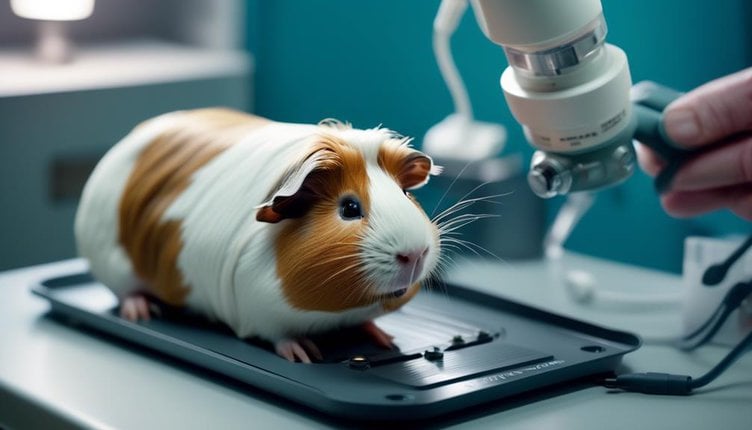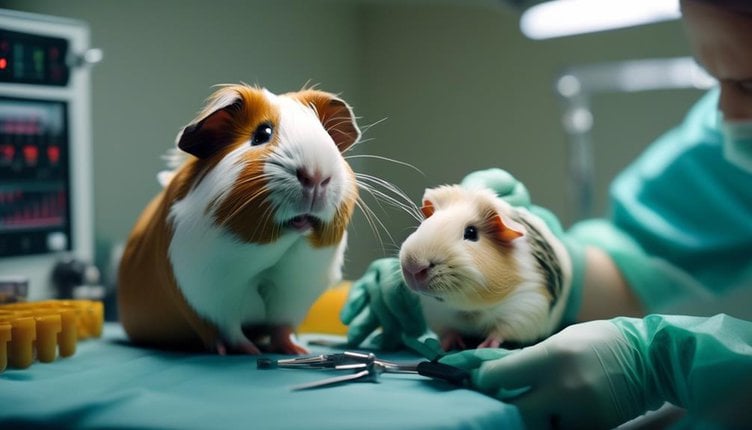Hey there, guinea pig lovers! Let's talk about something important – tumors in these adorable little creatures. I mean, seriously, who doesn't love a furry friend with an unexpected growth, right? But hey, no need to panic. We've got you covered with all the info you need to ensure your guinea pig's well-being.
So, what signs should you be on the lookout for? How can you make sure your precious pet gets the best care possible? Well, my friend, you've come to the right place. We're going to dive deep into this topic and give you all the juicy details.
First things first, let's talk about the common signs and symptoms of guinea pig tumors. These can include unusual lumps or bumps, changes in appetite or weight, difficulty breathing, and even changes in behavior. Now, don't freak out if you notice any of these things – just keep an eye on your little buddy and take note of anything out of the ordinary.
Now, let's move on to the diagnostic techniques used for early detection. Your veterinarian may use a combination of physical examinations, imaging tests, and even biopsies to determine if your guinea pig has a tumor. It's important to catch these things early, so make sure to schedule regular check-ups for your furry friend.
Okay, let's get to the good stuff – treatment options. Depending on the size, location, and type of tumor, your vet may recommend surgical removal, chemotherapy, or radiation therapy. The goal here is to get rid of that pesky tumor and get your guinea pig back to their happy, healthy self.
But wait, there's more! It's not just about the treatment – ongoing supportive care is crucial for your guinea pig's recovery. This can include pain management, dietary adjustments, and even behavioral modifications. Your vet will guide you through this process and make sure your little buddy gets all the love and care they need.
So, there you have it, folks. Tumors in guinea pigs are no joke, but with early detection and the right care, your furry friend can overcome this obstacle and live a long, healthy life. Stay vigilant, stay informed, and most importantly, give your guinea pig all the love they deserve.
Key Takeaways
- Guinea pigs are prone to developing tumors, which can be caused by genetics, age, hormonal imbalances, chemical exposure, and a weakened immune system.
- Regular observation and veterinary check-ups are important for early detection of tumors in guinea pigs.
- Diagnostic techniques such as imaging methods and biopsies are essential for early detection and determining the nature of tumors.
- Treatment options for guinea pig tumors include surgery, non-surgical alternatives like radiotherapy or chemotherapy, and palliative care. Supportive care, including a well-balanced diet and a clean and comfortable living environment, is crucial for the overall health and recovery of guinea pigs with tumors.
Understanding Guinea Pig Tumors
Understanding Guinea Pig Tumors involves recognizing the various types, their potential causes, and the importance of early detection for effective care. Guinea pig tumor causes can vary, but genetics is believed to play a significant role. Certain breeds, such as the Rex and Teddy guinea pigs, are more prone to developing tumors. Additionally, older guinea pigs have a higher risk of developing tumors compared to younger ones. Other potential causes include hormonal imbalances, exposure to certain chemicals or toxins, and a weakened immune system.
Prevention is crucial when it comes to guinea pig tumors. Providing a balanced diet that's rich in fresh fruits and vegetables can help support the guinea pig's immune system and reduce the risk of tumor development. Regular exercise and mental stimulation are also important in maintaining overall health and preventing tumors.
Early detection of tumors is vital for effective care. Regular health check-ups with a veterinarian should be a priority. Owners should be vigilant in observing any changes in their guinea pig's behavior, appetite, or physical appearance. If a tumor is suspected, a veterinarian can perform a thorough examination and recommend further diagnostic tests such as ultrasounds or biopsies.
Common Signs and Symptoms
When it comes to guinea pig tumors, there are common signs and symptoms that owners should be aware of.
One notable sign is the presence of visible lumps or bumps on the guinea pig's body. These can be felt during regular handling or observed while grooming.
Additionally, changes in behavior such as decreased appetite, lethargy, or increased aggression may also indicate the presence of a tumor.
Visible Lumps or Bumps
Early detection and timely care are crucial when it comes to visible lumps or bumps in guinea pigs, as they can be indicative of underlying tumors that require immediate attention. Guinea pigs are prone to developing various types of tumors, including mammary gland tumors, skin tumors, and abdominal tumors.
These tumors can present as small, firm, or movable lumps that can be felt or seen on the guinea pig's body. It's important for owners to regularly check their guinea pigs for any abnormal growths and seek veterinary advice if they notice any changes.
Diagnosing tumors in guinea pigs often involves physical examination, imaging tests, and sometimes a biopsy. Treatment options for guinea pig tumors may include surgery, chemotherapy, and radiation therapy, depending on the type and location of the tumor.
It's essential for owners to consult with a veterinarian to determine the best course of action for their guinea pig's specific situation.
Changes in Behavior
Changes in behavior can serve as common signs and symptoms that may indicate the presence of tumors in guinea pigs. It's crucial for guinea pig owners to closely observe their pet's behavior and emotional well-being. Here are five behavioral changes to watch for:
- Loss of appetite: A guinea pig with tumors may lose interest in food, resulting in weight loss and malnutrition.
- Decreased activity: Tumors can cause pain and discomfort, leading to reduced activity levels and reluctance to engage in usual activities.
- Changes in social behavior: Guinea pigs with tumors may become withdrawn or aggressive towards their cage mates.
- Altered sleep patterns: Tumors can disrupt a guinea pig's sleep, causing them to sleep more or experience difficulty in getting comfortable.
- Unusual vocalizations: In some cases, guinea pigs may vocalize more frequently or exhibit distress calls as a response to the presence of tumors.
Monitoring these behavioral changes can help detect tumors early and ensure timely intervention for the well-being of the guinea pig.
Diagnostic Techniques for Early Detection

To detect tumors in guinea pigs at an early stage, veterinarians rely on various diagnostic techniques.
Imaging methods such as X-rays, ultrasound, and CT scans are commonly used to visualize the internal structures and identify any abnormal growths.
Additionally, biopsy procedures, which involve the removal of a small tissue sample for examination, can provide valuable information about the nature of the tumor.
These diagnostic techniques play a crucial role in the early detection and subsequent treatment of guinea pig tumors, ensuring the best possible care for these furry companions.
Imaging Methods
Researchers have developed various imaging methods that enable the early detection of tumors in guinea pigs, allowing for timely and effective care. These imaging techniques utilize advanced imaging technologies to provide detailed and accurate images of the guinea pig's internal organs and tissues.
Here are five imaging methods commonly used for tumor detection:
- X-ray imaging: This technique uses high-energy radiation to produce images of the guinea pig's bones and soft tissues.
- Ultrasound imaging: By using high-frequency sound waves, this method creates real-time images of the guinea pig's organs and can detect abnormalities in their structure.
- Magnetic Resonance Imaging (MRI): This non-invasive technique uses a magnetic field and radio waves to generate detailed images of the guinea pig's body, providing valuable information about the location and size of tumors.
- Computed Tomography (CT) scan: This imaging method combines X-ray technology with computer processing to create cross-sectional images of the guinea pig's body, providing a clearer view of internal structures.
- Positron Emission Tomography (PET) scan: This technique involves injecting a small amount of radioactive material into the guinea pig's body, which is then detected by a scanner to create images that reveal metabolic activity and the presence of tumors.
These imaging methods play a crucial role in the early detection of tumors in guinea pigs, enabling veterinarians to provide prompt and targeted care to ensure the well-being of these beloved pets.
Biopsy Procedures
One of the key diagnostic techniques for the early detection of tumors in guinea pigs is through biopsy procedures. These procedures involve the extraction and analysis of tissue samples to determine the presence and nature of abnormal cells or growths. Biopsy techniques play a vital role in the accurate diagnosis and treatment of tumors in guinea pigs.
Histopathology interpretation, which involves the examination of tissue samples under a microscope, is an essential part of the biopsy procedure. It allows veterinarians to identify abnormal cellular changes, determine the type and stage of the tumor, and develop an appropriate treatment plan.
Timely and accurate histopathology interpretation is crucial in providing the best possible care for guinea pigs with tumors. By utilizing biopsy techniques and histopathology interpretation, veterinarians can ensure early detection, accurate diagnosis, and effective treatment of tumors in guinea pigs, ultimately improving their overall well-being.
Treatment Options for Guinea Pig Tumors
Treatment options for guinea pig tumors encompass a range of approaches that aim to effectively manage and alleviate the condition, ensuring the well-being of these beloved pets. When it comes to treating guinea pig tumors, there are several options available that can help improve the quality of life for these small animals.
Here are five treatment options to consider:
- Surgery: In some cases, surgical removal of the tumor may be the best option. However, this can be a complex procedure and should be performed by a veterinarian experienced in treating guinea pigs.
- Non-surgical alternatives: Depending on the type and size of the tumor, non-surgical alternatives such as radiotherapy or chemotherapy may be recommended. These treatments aim to shrink or slow down the growth of the tumor.
- Palliative care: In situations where the tumor is inoperable or the guinea pig isn't a suitable candidate for surgery, palliative care can help manage the symptoms and improve the guinea pig's comfort. This may involve pain management, dietary adjustments, and providing a comfortable environment.
- Regular monitoring: It's important to regularly monitor the tumor's progression and the guinea pig's overall health. This can help identify any changes or complications, allowing for timely intervention.
- Emotional support: Dealing with a guinea pig tumor can be emotionally challenging for pet owners. It's essential to seek emotional support through online communities or local support groups to cope with the stress and uncertainty.
Surgical Intervention and Recovery

As the focus shifts towards surgical intervention and recovery for guinea pig tumors, veterinarians with expertise in treating these delicate animals are equipped to perform intricate procedures that aim to remove the tumor and ensure a smooth and successful recovery for these beloved pets. Guinea pigs are known for their sensitivity to anesthesia and the potential for postoperative complications. Therefore, it is crucial to provide appropriate surgical recovery and postoperative care to minimize discomfort and promote healing.
During the surgical intervention, the veterinarian carefully removes the tumor while taking utmost care to preserve surrounding healthy tissue. The procedure may involve the use of specialized instruments and techniques to minimize trauma and facilitate a quicker recovery.
After the surgery, the guinea pig requires a period of postoperative care to ensure a successful recovery. This includes monitoring vital signs, managing pain with appropriate medications, and providing a clean and comfortable environment. Additionally, the guinea pig's diet may need to be adjusted to support healing and prevent constipation, as postoperative immobility can sometimes lead to digestive issues.
To help guinea pigs recover from surgery, it is important to provide them with gentle handling, regular wound checks, and a stress-free environment. Any signs of complications, such as infection or abnormal swelling, should be promptly addressed by the veterinarian.
Overall, careful surgical intervention and diligent postoperative care are essential for the successful treatment of guinea pig tumors. By providing the necessary support and monitoring, veterinarians can ensure a smooth recovery and improve the quality of life for these precious pets.
| Surgical Recovery | Postoperative Care |
|---|---|
| Monitor vital signs | Manage pain with appropriate meds |
| Handle guinea pig gently | Regular wound checks |
| Provide stress-free environment | Adjust diet for healing |
| Address complications promptly | Maintain clean and comfortable env |
Supportive Care and Management
Supportive care and management play a crucial role in ensuring the overall well-being and comfort of guinea pigs undergoing treatment for tumors. Guinea pig nutrition is a key aspect of supportive care, as a well-balanced diet can help boost their immune system and aid in their recovery. Providing a variety of fresh vegetables, hay, and a high-quality guinea pig pellet will ensure they receive essential nutrients.
Pain management is another important component of supportive care. Guinea pigs experiencing pain from tumors may require medication to alleviate their discomfort. Working closely with a veterinarian, pain medication can be prescribed and administered to help improve their quality of life.
In addition to nutrition and pain management, providing a clean and comfortable living environment is essential. Regular cage cleaning, fresh bedding, and ample space for exercise are vital for their overall well-being.
Social interaction is also crucial for guinea pigs undergoing treatment. Spending quality time with them, providing gentle handling, and engaging in playtime can help reduce stress and boost their spirits.
Lastly, regular veterinary check-ups are necessary to monitor the progress of the treatment and to address any concerns promptly. Through attentive supportive care and management, guinea pigs can have a better chance at a comfortable and successful recovery.
Preventive Measures and Long-term Health Maintenance

To ensure the long-term health and well-being of guinea pigs who've undergone treatment for tumors, it's essential to implement preventive measures that promote overall health and maintenance. Preventing tumors in guinea pigs can be achieved through a combination of proper nutrition and proactive care.
Nutritional guidelines play a crucial role in preventing tumors in guinea pigs. Providing a balanced diet that's high in fiber is essential for their digestive health. Guinea pigs should have a constant supply of fresh hay, which aids in maintaining healthy teeth and preventing the development of dental problems that can contribute to tumor growth. Additionally, a diet rich in vegetables and fruits, such as leafy greens and bell peppers, provides essential vitamins and antioxidants that support the guinea pig's immune system and help prevent the formation of tumors.
Regular veterinary check-ups are also essential for long-term health maintenance. These visits allow for early detection of any potential health issues, including the early signs of tumors. A veterinarian can perform thorough physical examinations and recommend appropriate screening tests to monitor the guinea pig's overall health and detect any abnormalities.
Furthermore, maintaining a clean and stress-free environment is crucial in preventing tumors in guinea pigs. Regular cage cleanings, proper ventilation, and minimizing exposure to harmful chemicals or toxins can help reduce the risk of tumor development.
Frequently Asked Questions
Can Guinea Pig Tumors Be Contagious to Other Guinea Pigs?
Are guinea pig tumors contagious to other guinea pigs? While genetic factors play a role in tumor development, there is no evidence to suggest that guinea pig tumors can be transmitted from one animal to another.
Are There Any Alternative Treatment Options for Guinea Pig Tumors Besides Surgery?
Alternative therapies and medication options exist for guinea pig tumors besides surgery. These treatments can provide relief and improve the quality of life for the affected guinea pigs, offering a compassionate approach to their care.
Can Guinea Pig Tumors Be Prevented Through Diet and Exercise?
Preventive measures play a vital role in managing guinea pig tumors. While diet and exercise can contribute to overall health, the impact of genetics cannot be ignored. Regular veterinary check-ups and early detection remain crucial for optimal care.
How Often Should Guinea Pigs Be Screened for Tumors?
Guinea pigs should be screened for tumors regularly to ensure early detection. The optimal tumor screening frequency may vary depending on factors such as age and breed. Early detection methods are crucial for effective care and treatment.
Are There Any Specific Breeds of Guinea Pigs That Are More Prone to Developing Tumors?
Some specific breeds of guinea pigs, such as the Abyssinian and the Peruvian, are more prone to developing tumors due to genetic factors. Early detection and care are crucial for their well-being.





